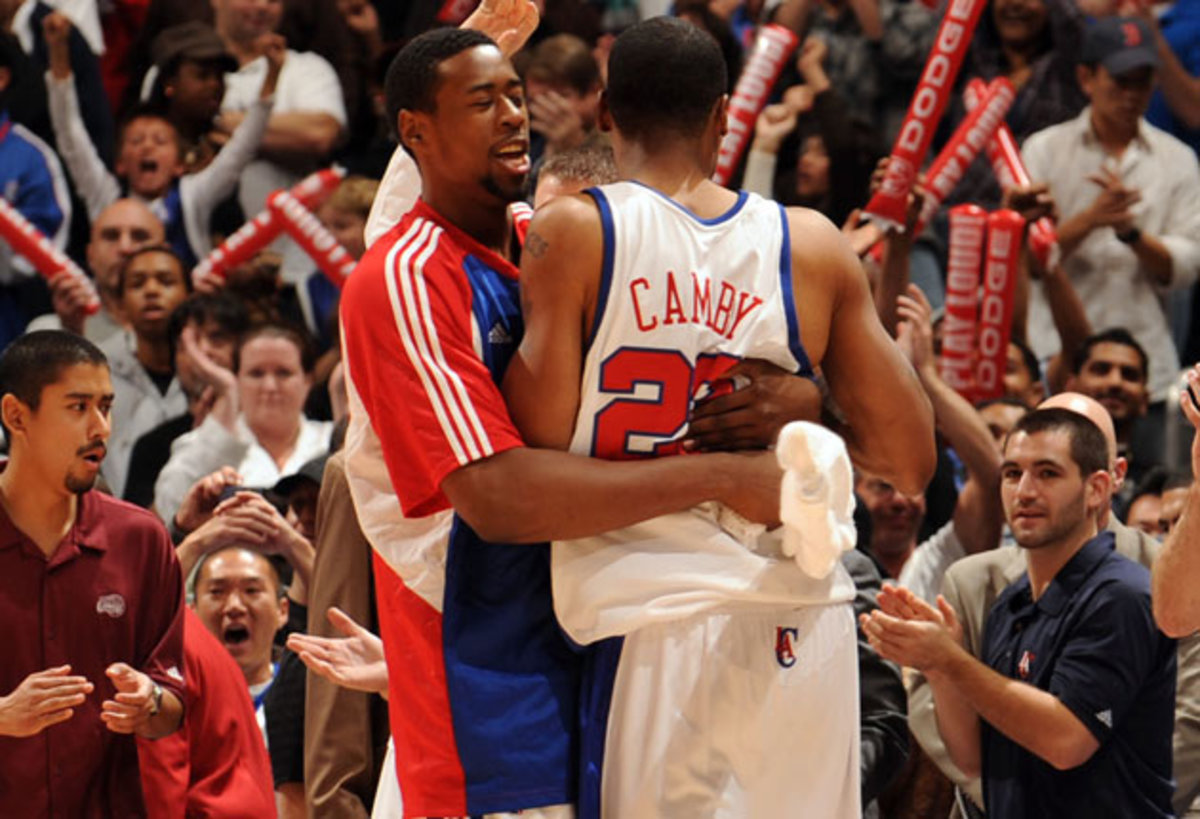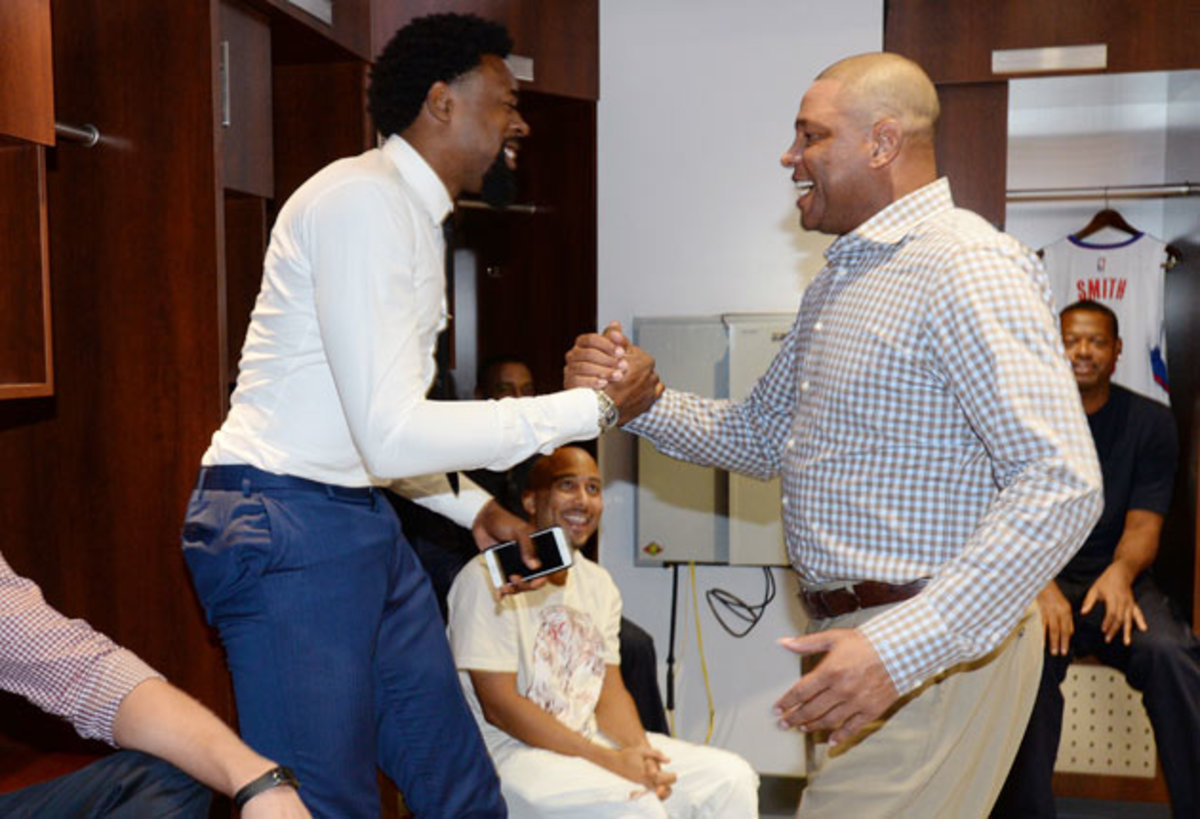DeAndre Jordan's existential struggle and his chance to be a Clipper for life

LOS ANGELES—“Clipper for life!” Marcus Camby used to holler, when 19-year-old DeAndre Jordan strode into the Playa Vista practice facility with boxes of Krispy Kreme doughnuts tucked under his anaconda arms. Jordan grinned, happy just to fulfill the most mundane rookie duties, but he couldn’t possibly tell whether Camby’s nickname was a compliment. There was no such thing as a Clipper for life. Everybody on the roster was either coming from a better place or headed there. For some, the franchise was a springboard. For others, it was a last stop. Never was it both. “I knew that was going to change,” Camby said Tuesday. “And he was going to be a big part of it.”
Jordan stands 6’11”, with a 7’6” wingspan, and at the apex of his vertical leap he looks down on the hoop like an open manhole cover. When he dives to the rim, and catches on the move, he dunks with single-minded ferocity. When he strays from the block, or stands at the free-throw line, gears shift in his head. “He is a thinker,” said his mother, Kimberly Jordan-Williams. “He mulls things over.” As a senior at Christian Life Center Academy in Houston, he once hid under the bleachers, dodging recruiters who were trying to lure him. He signed with Texas A&M, then bolted for the draft after his freshman season, a decision he promptly regretted. He dropped to the second round, but fell to the perfect spot, and he might have been the first player who ever could have said that about the Clippers.
Inside first-ever NBA Players' Awards: NBPA's night a spectacle in progress
Blake Griffin arrived a year later and Chris Paul two years after that. But Jordan was the Original Clipper, growing at the same rate as the team, an afterthought, then an upstart, then an attraction. In one year under Doc Rivers, he became a defensive dynamo. In two years, he became a front-court star. He wanted to know what was next, and the Mavericks sold him on that. He could anchor an offense and headline an organization, a pitch that appealed to a young free agent’s ambition and ego.
Jordan verbally committed to the Mavs on July 3, and two days later, woke up at home in Houston with a pit in his stomach familiar to anyone who ever took a job or bought a house or entered a marriage that didn’t seem quite right. “It was nervousness,” Jordan said. “It was the gut feeling that something is wrong. I didn’t want to just ignore that feeling and let it go. I wanted to be sure.” On the outside, he was typical D.J., engaging and playful. But his mom could see the gears shifting again. “He was still thinking,” she said. He was also reminiscing, about departed teammates and fired coaches, mornings in the gym and nights on the bench. “Not playing, to playing a little, to being in the rotation, to being a starter,” Jordan said. “Wanting to play now and wanting to be a top player now. The whole long, annoying, stressful grind.”
Those memories, as maddening as they may have been, pulled him back. “I’m on the right path, Jordan told himself. “I’ve done this the right way. Everything I’ve done was to get to this point with this team. Why go somewhere else when I’m so close?” Camby, who still works out with Jordan in Houston, encouraged him to list pros and cons. The Clippers boasted arguably the premier point guard and power forward in the league. The Mavericks countered with Dirk Nowitzki, who is 37, Chandler Parsons, who is coming off knee surgery, and Wes Matthews, who is coming off Achilles surgery. How the Mavs ever narrowed such a yawning gap is a testament to the recruiting prowess of Parsons and owner Mark Cuban.

“You can get caught up in the glitz and the glam of the process,” Jordan said. “But you can’t take any of that process onto the floor, and once it slows down, you think about the basketball again. You think about where you can play the best basketball.” As he spoke, on Tuesday afternoon, he was sitting in the Clippers equipment closet. He could not have seemed further away from the nightclubs and sushi restaurants where the Mavericks courted him.
The NBA is often divided into two categories, one very small, and the other very big. In the first category are players who do virtually everything for their teams. You know them by their first names, or nicknames, or initials: LeBron, KD, Steph, Blake, Russ, CP3, The Beard, The Brow. There are more, of course, but not a lot more. In the second category are players who do only a few things, but do them exceptionally well. Inside many of those players is an existential struggle. Do they add dimensions, in an attempt to join that first category, or do they simply refine the skills that distinguished them to begin with?
Jordan's reversal keeps Clippers contending, brings Mavs' undoing
Jordan embodies the struggle. There may not be a better finisher and rim protector in the league. He yearns to expand his role, and yet, he recognizes the risks involved. “Shoot threes every night?” Probably not the best decision,” Jordan said. “But I feel like there are other things I can do that will contribute to the team—playing back-to the-basket, facing up, taking small steps to becoming a more complete player. But I don’t want to go outside my game and outside of what’s gotten me here.”
July 8 will be remembered for transit emojis, barricaded doors and chicken fingers from a spot called Raising Cane’s. “I did make some fun memes,” Jordan said. But the enduring part of that day was the two-hour conversation with teammates when Jordan was reminded what he meant to the Clippers’ past and what he will mean to their future. He looked across the room at newly acquired Paul Pierce and recalled the nine years Pierce spent in Boston before he broke through and captured the 2008 championship. What if Jordan bailed and missed the first Clipper parade? “That would have sucked,” he said.

He won’t get as many touches in L.A. as he would have in Dallas, but he’ll get plenty, and he’ll get them deep into spring. The Clippers will likely be projected behind the Warriors, Spurs and Thunder, but they have retained their Big Three, while adding Pierce, Josh Smith and Lance Stephenson. “We’re right there,” Rivers said. Jordan will get booed at American Airlines Center, like few have ever been booed, but he could not bear to stick with a choice for the sake of avoiding those boos.
A year from now, or five, or 10, another free agent will come along who decides in 48 hours where to spend the prime of his career, and then feels the same pit in his stomach. There is no more human emotion than regret, but he will be lampooned as a flaky young millionaire, and scolded for going back on his word. “I would tell him to follow his heart,” Jordan said. “It’s not easy telling people, ‘No, I’m not coming,’ but you’re the one who will play there and live there.” Sometimes, second thoughts are the most rational kind.
On Tuesday, Jordan walked back into Staples Center, greeted by staffers who wondered if they would ever see him again. He wore a navy suit, a white pocket square and a sheepish smile. He succinctly termed his free agency a “total fiasco.” He echoed his Twitter apology to the Mavericks. He said he felt relieved. In the Clippers locker room, a box of Sprinkles cupcakes sat on a shelf under the grease board, below a message reading: “Happy Birthday D.J.” He is 27. He will be a free agent again in four years. No one can say where he will retire. But in the hallway, waiting for his old rook, Camby echoed the moniker that still fits:
“Clipper for life.”
